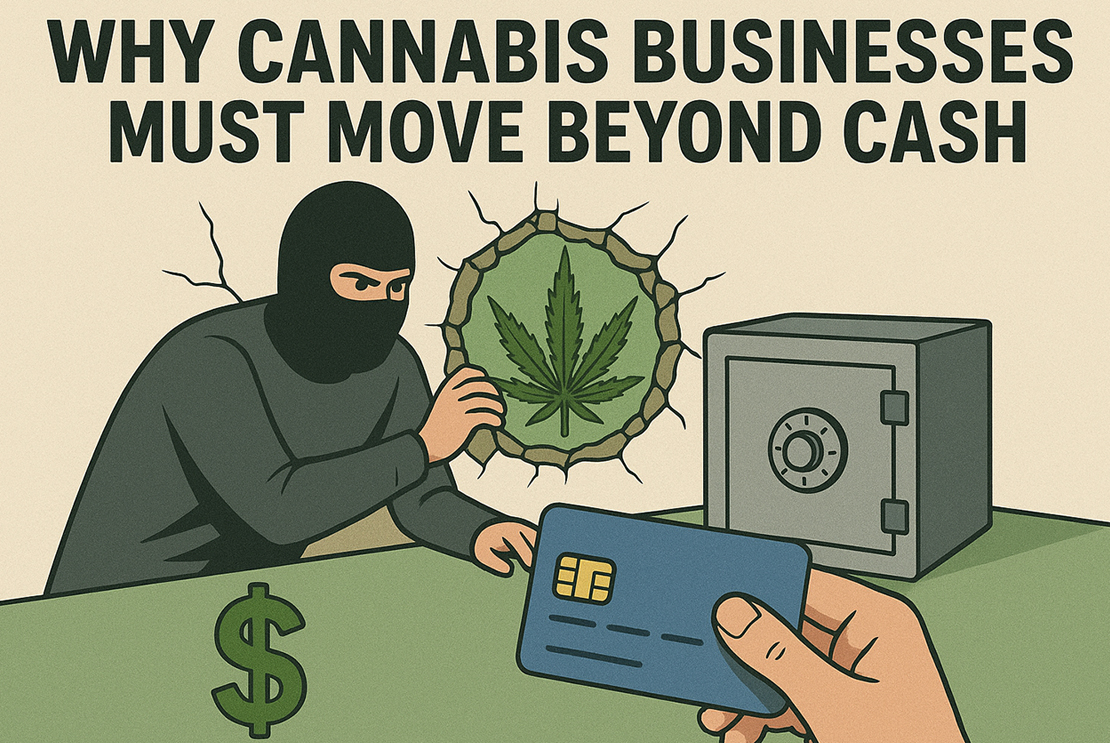Why Cannabis Dispensaries Must Move Beyond Cash: Lessons from a Dispensary Heist
A recent burglary at a dispensary in Pasadena, Texas, underscores the serious risks that come with operating as a cash-heavy cannabis business. According to video footage, the intruder broke through interior walls from an adjacent salon, rifled through drawers, and dragged out a safe full of cash. The owner later declined to press charges—still, the message is clear: relying on physical cash is a major vulnerability for cannabis operators. (ref article published at 420intel.com)
Here’s why cannabis companies should seriously consider—and advocate for—the ability to accept credit and debit card payments:
1. Reducing Physical Risk & Crime Exposure
Cash is a magnet for theft. Burglars know that if they can break in, there’s likely a large haul waiting. By minimizing cash on hand, your cannabis dispensary can reduce both the incentive and the payoff for break-ins and robberies. The incident in Texas shows how determined thieves can literally burn through walls to get to it.
2. Enhancing Safety for Staff & Customers
Operating with less physical cash reduces the pressure and risk for employees handling large sums. It also prevents dangerous stash rooms or safes that might become targets. In a safer environment, staff can focus less on security logistics and more on delivering a good customer experience.
3. Improving Financial Transparency & Compliance
Cannabis Debit & Credit Card payments automatically create records in banking systems, which can simplify accounting, auditing, and regulatory compliance. In a highly scrutinized industry like cannabis, solid transaction trails help build legitimacy and reduce risk during inspections or legal scrutiny.
4. Boosting Sales & Customer Convenience
Many consumers prefer paying with cards for convenience, rewards, or so they don’t have to carry cash. Offering card options can capture more sales, improve the customer experience, and help cannabis businesses compete more cleanly with other retailers.
5. Strengthening Business Resilience
If a business is robbed and loses its daily cash proceeds, that can mean lost payroll, missed bills, or even forced temporary closure. With funds already in banking accounts via card payments, the business is less vulnerable to a single catastrophic incident.
What’s Holding Cannabis Back — and What Needs to Change
The crux of the issue is that federal regulations in many jurisdictions make it difficult for cannabis businesses to access banking and payment processing. Many traditional banks and processors balk at doing business in a federally controlled industry. That leaves operators stuck with cash-only systems, often forced to rely on armored services or manual cash handling.
To break free from this model, cannabis operators should:
-
Lobby for clearer state/federal guidelines that protect financial institutions working with licensed cannabis businesses.
-
Partner with payment services and fintechs explicitly enabling cannabis — many emerging providers are building compliant solutions just for this sector.
-
Design internal policies (e.g., daily cash limits, secure drop boxes, minimal on-site cash) to mitigate risk in the interim.
-
Prioritize security (surveillance, alarms, safe timing protocols) while transitioning to less cash-intensive models.
Final Thought
The dramatic story of a safe being ripped out through walls is a powerful wake-up call: cash is a liability in dispensaries. As the cannabis industry matures, moving toward card acceptance isn’t just a nice-to-have — it’s a business imperative for safety, transparency, and sustained growth.
You can learn more about cannabis payment processing options here, or reach out for a free consultation with our experts today.

About the Author: Daryl Eames is the founder of Loanviser and the NH Cannabis Association. He has advocated for cannabis legalization in the state of New Hampshire and has deep experience in cannabis financing and cannabis merchant processing, servicing the cannabis industry since 2019.






